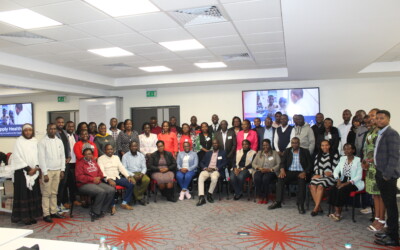“Learning how to learn is life’s most important skill”, in the words of Tony Buzan*.
Skills bear the core of every knowledge gained beyond knowing, and this is what defines the art of actuality. At inSupply Health, our art has been building skills beyond the scope of supply chain technical knowledge, and to us knowledge is best actualized in doing. The supply chain world is fast paced with new practices and innovations emerging every day and due to the COVID-19 pandemic it is increasingly transforming to virtual spaces.
The Virtual Learning Packages are self-directed, online based, modular courses aimed at building specific competencies and skills necessary for improving supply chain performance and encouraging a data use culture. These modules cover topics ranging from data analysis, review and visualization, to supply chain management and problem solving skills for effective decision making. The modules are anchored on personas derived from the supply chain quality improvement teams (IMPACT Teams) and based on their technical competencies.
Let’s say you have an amazing team of data analysts and data is always available and on time for review every month, but no one organizes the meetings or sets the agenda. Hold that thought. During IMPACT Team meetings, members not only focus on data review, analysis, visualization and presentation, but also plan for meetings ahead of time and come up with action plans after the meeting. The IMPACT Team process captures and acknowledges every step involved in making sure the goal of learning from data and making the right decisions is achieved, which is why it is effective.
Now bring back your thoughts on the previous scenario where we have an amazing team of data analysts and an inability to get organized for a productive meeting. At this point you are stuck with having individual team members review the data and share inputs separately, but then, how long will it take to make a decision using this approach? What if there was a role for each member within the team of analysts beyond the data review skills? The Virtual Learning Packages ensure that each member has a role to play in the data review team, so that meetings are not only held, but they are consistent, productive, and that decisions are made based on the data.
The Organizing Otto module builds team member’s organizational skills like time management, communication, coordination, and report writing. Data analysis is core to data review meetings and the Data Wiz Diana module builds learner’s knowledge of improved supply chain data analysis, interpretation and visualization. The Supply Chain Sam module ensures that learners understand key supply chain concepts and know how to apply them in their day to day tasks. Finally, The Peter Problem Solver module, as the name suggests, builds competency in identifying and analyzing supply chain problems, and using problem solving processes that result in action planning.
Since the launch of the learning packages in April 2021, 284 learners have completed and been certified on completion of the modules by obtaining a score of 80% and above in the final quiz. The reward lies in how the skills are applied to the IMPACT Teams meetings and the significance it has in improving the process.
“Planning and convening the team has been seamless recently, the Organizing Otto course gave tips on how to make meetings productive and interesting”
said Analo, one of the IMPACT Team members in Kenya.
The evidence has been immense with the reduced dependency of these IMPACT Teams on inSupply staff, where 51% of IMPACT teams recorded low dependency in July from 32% in April.
The Virtual Learning Packages came at a time when most of the work was shifting to virtual spaces. Also, the ability to engage in self-paced learning allows the team members to better manage their time. These modules can be applied to a wide range of programs and review processes, not only limited to supply chain management. If the future of data review meetings will be virtual, then the learning packages are the place for us to begin the journey of improving data analysis competencies and unlocking the next level of supply chain strengthening.
*Wikipedia: “Buzan popularised the idea of mental literacy, radiant thinking, and a technique called mind mapping,[2] inspired by techniques used by Leonardo da Vinci, Albert Einstein, and Joseph D. Novak’s ‘concept mapping’ techniques.”


